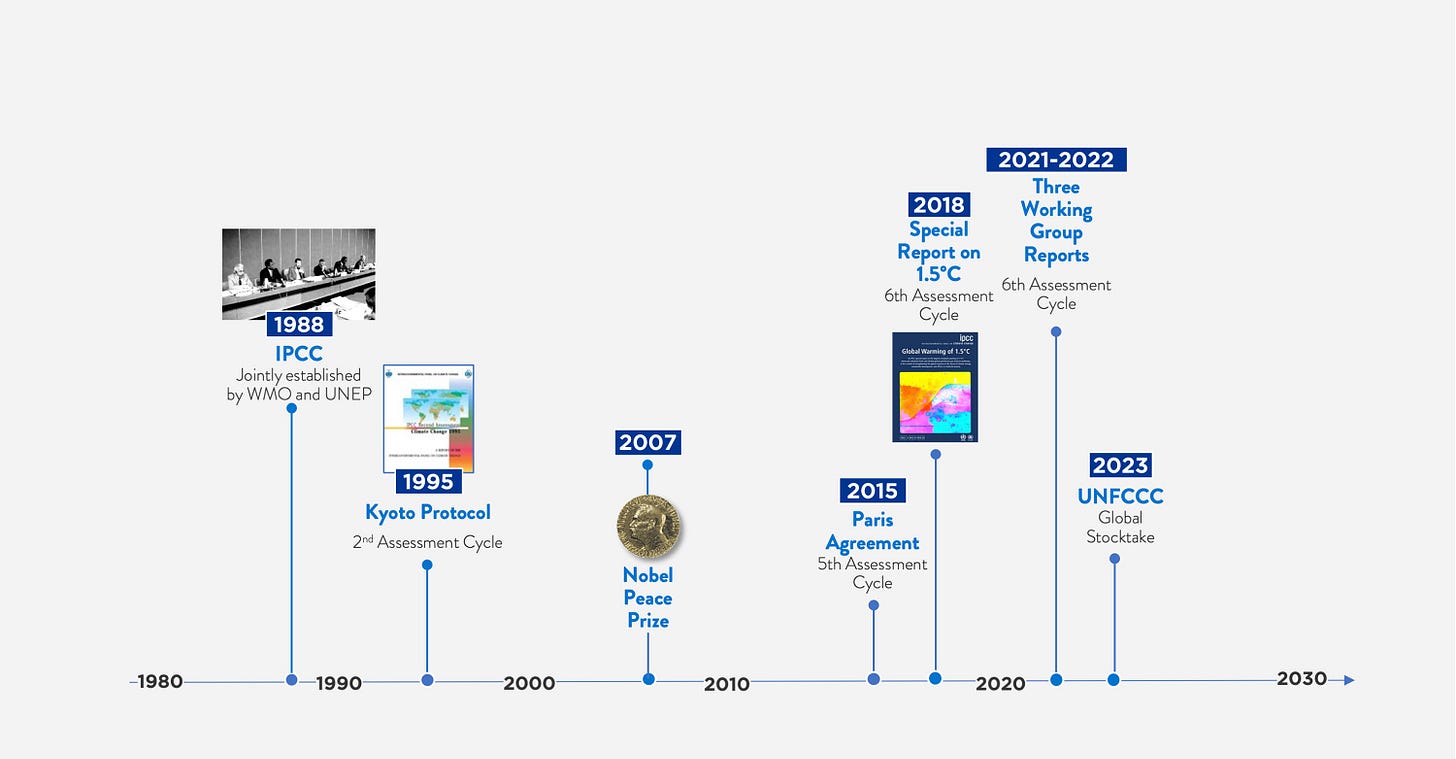Confirmation bias within the IPCC...
If the mission is to identify the negative impacts of climate change, one tends to ignore everything else.
A brief history of the IPCC…
The Intergovernmental Panel on Climate Change (IPCC) was established in 1988 by the World Meteorological Organization (WMO) and the United Nations Environment Programme (UNEP). Its formation was driven by concerns about the potential impacts of human-induced climate change and the need for a comprehensive scientific assessment of the issue.
Here is a brief timeline of the IPCC's history:
1988: The IPCC was established by the United Nations General Assembly and the WMO to provide a clear assessment of scientific knowledge on climate change, its potential impacts, and options for mitigation and adaptation.
1990: The IPCC released its First Assessment Report (AR1), which presented a comprehensive assessment of the scientific understanding of climate change at the time. It concluded that human activities, particularly the burning of fossil fuels, were contributing to an enhanced greenhouse effect and would likely lead to future warming.
1995: The IPCC released its Second Assessment Report (AR2), which provided an updated assessment of the science and impacts of climate change. It concluded that the balance of evidence suggested a discernible human influence on global climate.
2001: The IPCC released its Third Assessment Report (AR3), which presented a more detailed understanding of climate change and its impacts. It emphasized the role of human activities in driving global warming and highlighted the need for urgent action.
2007: The IPCC released its Fourth Assessment Report (AR4), which incorporated advancements in climate science since the previous assessment. It strengthened the understanding of anthropogenic climate change, provided regional climate projections, and highlighted the potential risks associated with warming.
2013-2014: The IPCC released its Fifth Assessment Report (AR5) in several parts between 2013 and 2014. AR5 synthesized the latest scientific knowledge on climate change, including the physical science basis, impacts, adaptation, and mitigation options. It also introduced the concept of carbon budgets, highlighting the need to limit cumulative emissions to avoid dangerous levels of warming.
2015: The IPCC released the Special Report on Global Warming of 1.5°C, which assessed the impacts of global warming at 1.5 degrees Celsius above pre-industrial levels and the pathways to limit warming to this level. It played a crucial role in informing the negotiations of the Paris Agreement.
2018: The IPCC released the Special Report on Global Warming of 1.5°C. It provided an updated assessment of the impacts of global warming and emphasized the urgency of taking strong action to limit temperature rise to 1.5 degrees Celsius.
2023: The IPCC released AR6 Synthesis Report: Climate Change 2023. The synthesis report which summarises the entire document was finalized at the 58th plenary meeting of the panel at Interlaken in March 2023 and was published on 20 March 2023.
Source: https://unfoundation.org/blog/post/ahead-of-the-next-major-global-climate-report-5-questions-about-the-ipcc/
The IPCC mission statement…
The mission statement of the IPCC is as follows:
"The Intergovernmental Panel on Climate Change (IPCC) is the leading international body for the assessment of climate change. It was established by the United Nations Environment Programme (UNEP) and the World Meteorological Organization (WMO) in 1988 to provide policymakers with regular scientific assessments concerning climate change, its implications, and potential future risks, as well as to put forward adaptation and mitigation options."
Thus, according to the mission statement, the IPCC was established to identify “future risks” associated with climate change and ignores any potential benefits of a warmer and more stable climate. Does this create an inherent confirmation bias?
What is confirmation bias?
Confirmation bias is a cognitive bias that refers to the tendency of individuals to seek, interpret, or recall information in a way that confirms their preexisting beliefs or hypotheses while ignoring or downplaying conflicting evidence. It leads people to selectively favor information that aligns with their existing views and dismiss or discount information that contradicts them.
In the context of climate science, confirmation bias can manifest in various ways. Here are a few examples:
Selective Exposure: People may actively seek out sources of information that align with their preconceived notions about climate change. For instance, individuals who overestimate the significance of human-caused climate change may be more likely to follow and trust sources that reinforce their alarmism.
Interpretation Bias: Individuals may interpret climate-related information in a way that confirms their existing beliefs. They may emphasize data or arguments that support their position while dismissing or downplaying opposing evidence.
Motivated Reasoning: People may engage in motivated reasoning, which involves selectively evaluating information and arguments in a way that supports their desired conclusion. In the case of climate science, individuals may be motivated by various factors, such as political ideology, economic interests, or personal values, which can influence their perception and evaluation of climate-related information.
Confirmation bias can hinder effective decision-making and impede the understanding of complex issues like climate change. It is important to recognize and address this bias by actively seeking diverse perspectives, critically evaluating information, and being open to considering evidence that challenges our existing beliefs. This approach helps foster a more comprehensive and balanced understanding of climate science and facilitates informed decision-making. Claims by leading climate scientists that ‘the science is settled’ directly work against this and ensure future confirmation bias.
Some commonly stated aspects of climate change by the IPCC…
Keep reading with a 7-day free trial
Subscribe to Irrational Fear to keep reading this post and get 7 days of free access to the full post archives.



